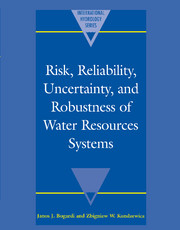Book contents
- Frontmatter
- Contents
- List of Contributors
- 1 Introduction
- 2 Integrated regional risk assessment and safety management: Challenge from Agenda 21
- 3 Risk analysis: The unbearable cleverness of bluffing
- 4 Aspects of uncertainty, reliability, and risk in flood forecasting systems incorporating weather radar
- 5 Probabilistic hydrometeorological forecasting
- 6 Flood risk management: Risk cartography for objective negotiations
- 7 Responses to the variability and increasing uncertainty of climate in Australia
- 8 Developing an indicator of a community's disaster risk awareness
- 9 Determination of capture zones of wells by Monte Carlo simulation
- 10 Controlling three levels of uncertainties for ecological risk models
- 11 Stochastic precipitation-runoff modeling for water yield from a semi-arid forested watershed
- 12 Regional assessment of the impact of climate change on the yield of water supply systems
- 13 Hydrological risk under nonstationary conditions changing hydroclimatological input
- 14 Fuzzy compromise approach to water resources systems planning under uncertainty
- 15 System and component uncertainties in water resources
- 16 Managing water quality under uncertainty: Application of a new stochastic branch and bound method
- 17 Uncertainty in risk analysis of water resources systems under climate change
- 18 Risk and reliability in water resources management: Theory and practice
- 19 Quantifying system sustainability using multiple risk criteria
- 20 Irreversibility and sustainability in water resources systems
- 21 Future of reservoirs and their management criteria
- 22 Performance criteria for multiunit reservoir operation and water allocation problems
- 23 Risk management for hydraulic systems under hydrological loads
1 - Introduction
Published online by Cambridge University Press: 18 January 2010
- Frontmatter
- Contents
- List of Contributors
- 1 Introduction
- 2 Integrated regional risk assessment and safety management: Challenge from Agenda 21
- 3 Risk analysis: The unbearable cleverness of bluffing
- 4 Aspects of uncertainty, reliability, and risk in flood forecasting systems incorporating weather radar
- 5 Probabilistic hydrometeorological forecasting
- 6 Flood risk management: Risk cartography for objective negotiations
- 7 Responses to the variability and increasing uncertainty of climate in Australia
- 8 Developing an indicator of a community's disaster risk awareness
- 9 Determination of capture zones of wells by Monte Carlo simulation
- 10 Controlling three levels of uncertainties for ecological risk models
- 11 Stochastic precipitation-runoff modeling for water yield from a semi-arid forested watershed
- 12 Regional assessment of the impact of climate change on the yield of water supply systems
- 13 Hydrological risk under nonstationary conditions changing hydroclimatological input
- 14 Fuzzy compromise approach to water resources systems planning under uncertainty
- 15 System and component uncertainties in water resources
- 16 Managing water quality under uncertainty: Application of a new stochastic branch and bound method
- 17 Uncertainty in risk analysis of water resources systems under climate change
- 18 Risk and reliability in water resources management: Theory and practice
- 19 Quantifying system sustainability using multiple risk criteria
- 20 Irreversibility and sustainability in water resources systems
- 21 Future of reservoirs and their management criteria
- 22 Performance criteria for multiunit reservoir operation and water allocation problems
- 23 Risk management for hydraulic systems under hydrological loads
Summary
We are pleased to offer the reader a volume consisting of contributions of the Third George Kovacs Colloquium held in UNESCO, Paris from September 19 to 21, 1996. It is a continuation of a series of biannual international scientific meetings organized jointly under the auspices of the International Hydrological Programme (IHP) of UNESCO and the International Association of Hydrological Sciences (IAHS) in the challenging fields of water resources research. These meetings commemorate the late Professor George Kovacs, established authority in hydrology, who paid valuable service to both organizations convening this Colloquium. Professor Kovacs was Chairman of the Intergovernmental Council of the IHP of UNESCO and President of the IAHS.
The theme of the Colloquium, “Risk, Reliability, Uncertainty, and Robustness of Water Resources Systems,” denotesan essential recent growth area of research into water resources, with challenges and difficulties galore. The two-and-a-half-day Colloquium included twenty-four oral presentations covering a broad range of scientific issues. It dealt with different facets of uncertainty in hydrology and water resources and with several aspects of risk, reliability, and robustness.
The contributions to the Colloquium concentrated on the state-of-the-art approaches to the inherent problems. They also outline the possible future, identify challenging prospects for further research and applications. Presentations included both theoretical and applied studies, while several papers dealt with regional problems. Methodological contributions focused on underlying concepts and theories.
The presentations at the Colloquium, based on invitation, were delivered in three categories: keynote lectures, invited lectures, and young scientists' communications. Contributions belonging to all three categories are included in this volume.
- Type
- Chapter
- Information
- Publisher: Cambridge University PressPrint publication year: 2002

